What do rabbits need?
What Do Rabbits Eat in the Wild?
In the wild, rabbits mainly graze on grasses, leafy plants, and herbs. As natural foragers, they are constantly searching for fibrous foods that their digestive systems are designed to break down. But do rabbits eat blueberries in the wild? While they might occasionally nibble on small fruits if available, their primary diet consists of grasses and leafy greens.
Importance of a Balanced Diet
For domestic rabbits, the ideal diet should mimic their natural food intake as closely as possible. This means that hay, leafy greens, and specially formulated rabbit pellets should form the foundation of their diet. While bunnies can eat blueberries, fruits like these should be considered a treat rather than a daily staple.
Are Blueberries Safe for Rabbits?
Nutritional Value of Blueberries
Blueberries are packed with vitamins, antioxidants, and fiber. They contain vitamins C and K, which are beneficial for overall health and are known for their antioxidant properties, which help fight against free radicals. Given their nutritional content, many pet owners wonder: can bunnies have blueberries without any health risks? The answer is yes, but moderation is key.
Benefits of Blueberries for Rabbits
Blueberries can be a fun and nutritious treat for your rabbit when fed occasionally. They offer a different texture and flavor, which can add some variety to your rabbit’s diet. The antioxidants in blueberries may also support your rabbit’s immune system, and the fiber content can aid digestion. So, can bunnies eat blueberries and gain some benefits? Yes, as long as it’s given in small amounts.
Potential Risks of Feeding Blueberries to Rabbits
High Sugar Content
One of the main concerns with blueberries is their sugar content. Do bunnies eat blueberries without issues? They can, but rabbits have sensitive digestive systems, and too much sugar can lead to health problems like obesity or gastrointestinal discomfort.
Digestive Issues
Feeding too many blueberries may disrupt your rabbit’s gut balance, leading to diarrhea or loose stools. So while rabbits can eat blueberries, it’s important to monitor their digestive response and ensure you’re not overfeeding them with sugary fruits.
How Many Blueberries Can a Rabbit Eat?
Recommended Serving Size
Blueberries should be offered in small quantities—just one or two blueberries a couple of times a week are generally safe. For smaller rabbit breeds, even less is recommended, as their sensitive systems can’t handle as much sugar.
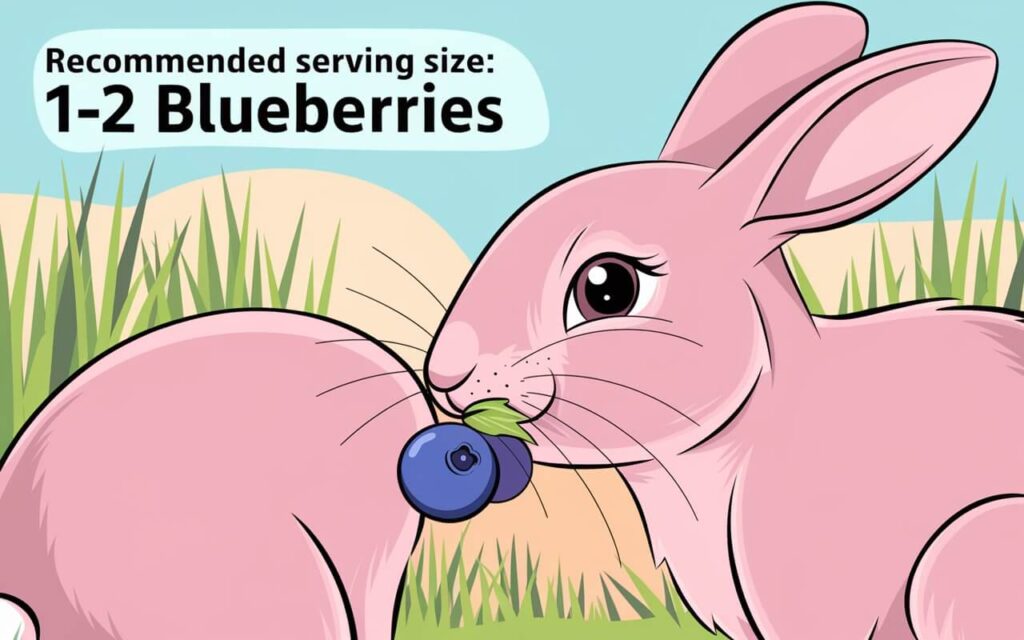
Frequency of Feeding Blueberries
Do rabbits eat blueberries often in their natural environment? Not really. Therefore, it’s best to treat blueberries as an occasional snack rather than a daily addition. Once a week should be enough for your bunny to enjoy their sweet flavor without the risk of digestive upset.
How to Properly Feed Blueberries to Rabbits
Fresh vs. Frozen Blueberries
Fresh blueberries are the best option for rabbits. They contain natural moisture and are free from additives. If you’re using frozen blueberries, ensure they are fully thawed and free from any preservatives or sugars before feeding them to your rabbit.
Steps to Prepare Blueberries
Before offering blueberries to your rabbit, make sure to wash them thoroughly to remove any pesticides or chemicals. You can serve them whole or cut them in half for easier chewing, depending on your rabbit’s size.
Signs of Overfeeding Blueberries
Symptoms to Look Out For
Overfeeding blueberries can lead to digestive upset in rabbits. Signs to watch for include diarrhea, bloating, or a reduction in appetite. If your rabbit eats too many blueberries, closely monitor their droppings and behavior to catch any signs of trouble early.
Alternatives to Blueberries
What Fruits Can Rabbits Eat
If you’re looking for other treats, consider offering small pieces of apple (without seeds), strawberries, or raspberries. These fruits are also safe in moderation and can provide some variety to your rabbit’s diet.
Can Rabbits Have Strawberries?
Vegetables as a Better Option
While fruits like blueberries are fun, vegetables such as leafy greens are a much better option. Foods like kale, parsley, and romaine lettuce provide essential nutrients without the high sugar content found in fruits.
When to Avoid Feeding Blueberries
Rabbits with Health Issues
If your rabbit has diabetes, obesity, or other digestive problems, it’s best to avoid feeding them blueberries. The sugar content could exacerbate these conditions, leading to further health complications.
Baby Rabbits
Young rabbits have more delicate digestive systems, so fruits like blueberries should be avoided until they are at least three months old. Stick to their natural diet of hay and greens during the early stages of their life.
Feeding Tips
- Moderation is Key: While rabbits can eat blueberries, they should only be a small part of your rabbit’s diet.
- Monitor Your Rabbit: After feeding blueberries for the first time, observe your rabbit’s behavior and droppings for any signs of digestive issues.
- Variety in Diet: Blueberries shouldn’t replace other essential foods like hay and leafy greens.
- Fresh and Clean: Always wash blueberries thoroughly to remove any pesticide residues.
- Avoid Overfeeding: Keep portions small—just one or two berries—and only offer them occasionally.
Are Blueberries Good for All Rabbit Breeds?
Generally, blueberries are safe for all rabbit breeds when given in moderation. However, smaller breeds, such as Netherland Dwarfs, may need even smaller portions because of their size and more sensitive digestion.
Tips for Introducing New Foods to Rabbits
Gradual Introduction
When introducing blueberries, start with a tiny piece and observe your rabbit for any signs of digestive upset. If they react well, you can gradually increase the serving size (but only up to one or two blueberries).
Monitoring Rabbit Behavior
Watch for changes in behavior or eating habits. If your rabbit seems lethargic or has abnormal droppings after trying blueberries, it might be best to avoid them in the future.
Common Misconceptions About Rabbit Diets
A common misconception is that rabbits can eat fruits and vegetables freely without consequences. In reality, many fruits are too high in sugar for a rabbit’s sensitive digestive system, and overfeeding can lead to health issues. Always treat fruit as an occasional snack.
Can Rabbits Eat Blueberry Leaves?
Blueberry leaves are generally safe for rabbits, though they may not be as palatable. If you decide to offer the leaves, make sure they are free of pesticides and introduce them slowly, just as you would with any new food.
How Blueberries Compare to Other Treats
Compared to other fruits, blueberries are relatively low in sugar, making them a better treatment option. However, vegetables like herbs, carrots (in small amounts), or cucumber are far superior in providing nutritional benefits without the risks of high sugar content.
Conclusion
So, can rabbits eat blueberries? Yes, they can, but it’s crucial to offer them in moderation. While blueberries are packed with beneficial nutrients, their high sugar content means they should only be an occasional treat. The key to keeping your rabbit healthy is a balanced diet rich in hay, leafy greens, and pellets, with fruits like blueberries given sparingly.
By following these guidelines, you can safely offer blueberries to your rabbit and ensure they remain happy, healthy, and well-nourished.
FAQs
- How many blueberries can my bunny have?
Your bunny can safely have 1-2 blueberries once or twice a week as a treat. It’s important to practice moderation to prevent digestive issues. - What fruits rabbits cannot eat?
Avoid feeding rabbits fruits like avocado, cherries, and fruit seeds/pits, as they can be toxic or harmful to their health. - What berries are good for bunnies?
Bunnies can enjoy blueberries, raspberries, and strawberries in moderation. These berries are safe but should be given sparingly due to their sugar content. - Can rabbits eat strawberries or blueberries?
Yes, rabbits can eat both strawberries and blueberries in small quantities as an occasional treat. - Can rabbits have cucumbers?
Yes, rabbits can eat cucumbers, which are low in calories and hydrating, but they should be offered in moderation.


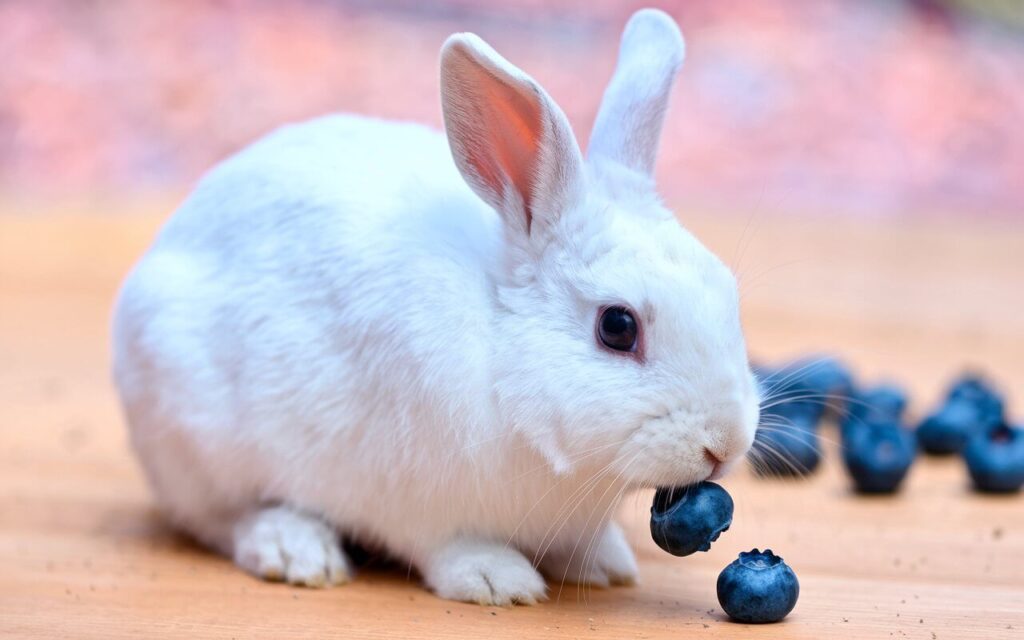
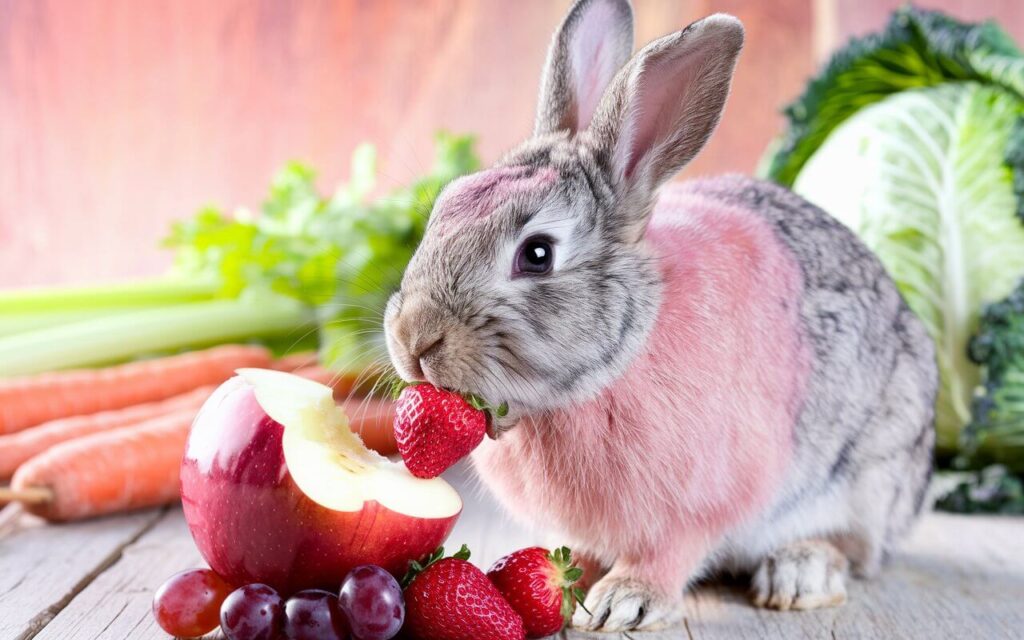
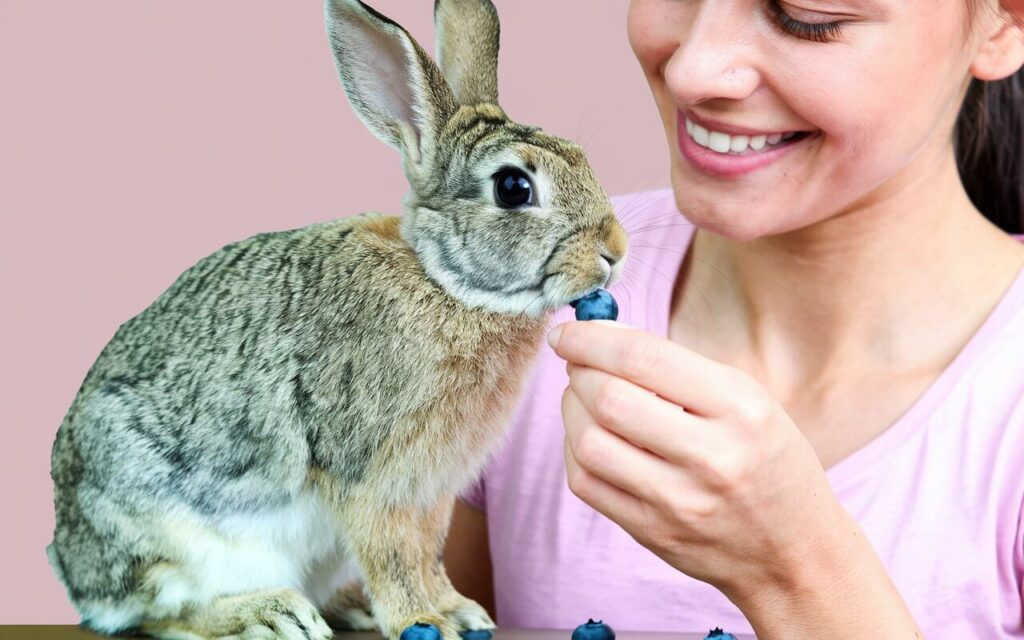
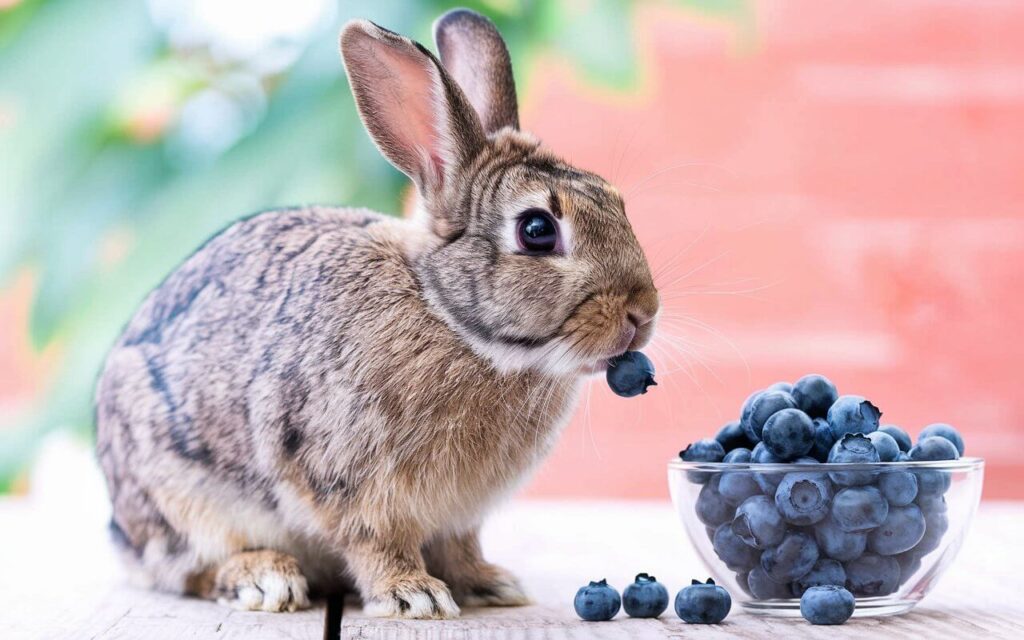
Leave a Reply